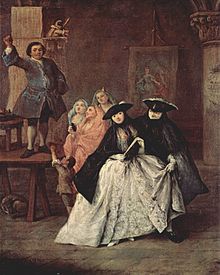Charlatan

A charlatan (also called swindler) is a person practicing quackery or some similar confidence trick in order to obtain money or advantage via some form of pretence or deception.
The word comes from French charlatan, a seller of medicines who might advertise his presence with music and an outdoor stage show. The most well known of the Parisian charlatans was Tabarin who set up a stage in the Place Dauphin, Paris in 1618, and whose commedia dell'arte inspired skits and whose farces inspired Molière. Ultimately, etymologists trace "charlatan" from either the Italian ciarlare, to prattle; or from Cerretano, a resident of Cerreto, a village in Umbria, known for its quacks.[1]
In usage, a subtle difference is drawn between the charlatan and other kinds of confidence people. The charlatan is usually a salesperson. He does not try to create a personal relationship with his marks, or set up an elaborate hoax using roleplaying. Rather, the person called a charlatan is being accused of resorting to quackery, pseudoscience, or some knowingly employed bogus means of impressing people in order to swindle his victims by selling them worthless nostrums and similar goods or services that will not deliver on the promises made for them. The word calls forth the image of an old-time medicine show operator, who has long left town by the time the people who bought his snake oil tonic realize that it does not perform as advertised.
In reported spiritual communications, a charlatan is a person who fakes evidence that a spirit is "making contact" with the medium and seekers. This has been challenged successfully by skeptics who wrote passwords and gave them to people of trust, containing a password that should be spoken by the person if he ever tried to make contact, to validate the truth of the claim. No such claim has been verified. For example, Brazilian writer Monteiro Lobato and magician Houdini.
Synonyms for "charlatan" include "mountebank", "shyster", and "quack". "Mountebank" comes from the Italian montambanco or montimbanco based on the phrase monta in banco - literally referring to the action of a seller of dubious medicines getting up on a bench to address his audience of potential customers.[2]
"Quack" is a reference to "quackery" or the practice of dubious medicine.
Famous charlatans
Famous American charlatans include John R. Brinkley, the "goat-gland doctor" who implanted goat glands as a means of curing male impotence, helped pioneer both American and Mexican radio broadcasting, and twice ran unsuccessfully for governor of Kansas. Another famous charlatan was Albert Abrams, the advocate of radionics and other similar electrical quackery who was active in the early twentieth century.[3]
Another famous charlatan is the Italian Alessandro Cagliostro (real name Giuseppe Balsamo) who claimed to be a Count.
See also
References
- ^ Charlatan. Dictionary.com
- ^ Dictionary Reference
- ^ Skeptics Dictionary
